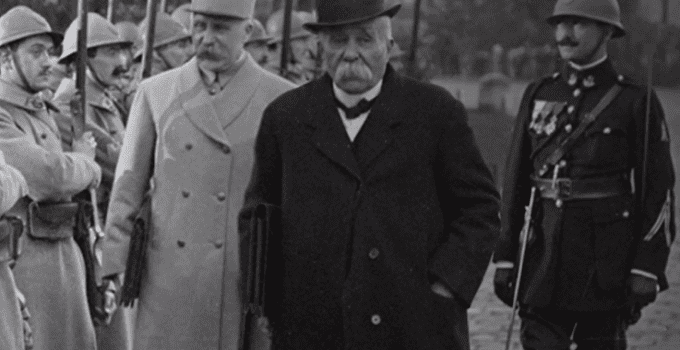Georges Clemenceau: The 10 Most Beautiful Quotes
Georges Clemenceau, a prominent French statesman and journalist, was known for his sharp wit and insightful observations. His quotes have stood the test of time, resonating with people around the world for their profound wisdom. In this article, we will explore the 10 best quotes by Georges Clemenceau, delving into their meanings and significance.
1. “War is too serious a matter to entrust to military men.”
This quote by Clemenceau reflects his skepticism towards military leaders and their ability to make decisions that affect the lives of countless individuals. As a politician who lived through the tumultuous times of World War I, Clemenceau understood the gravity of war and the importance of civilian oversight. This quote has become famous for its poignant reminder that war should not be left solely in the hands of those trained for combat.
2. “A man’s life is interesting primarily when he has failed – I well know. For it’s a sign that he tried to surpass himself.”
Clemenceau’s words here speak to the idea that failure is not something to be feared, but rather embraced as a necessary part of growth and self-improvement. By acknowledging that failure is a sign of courage and ambition, Clemenceau encourages us to push ourselves beyond our limits and strive for greatness. This quote is a reminder that success is not measured by the absence of failure, but by the willingness to take risks and learn from our mistakes.
3. “History is concerned with the facts, the passions, only with the truth.”
In this quote, Clemenceau distinguishes between the objective facts of history and the subjective emotions that shape our understanding of the past. By emphasizing the importance of truth over personal bias, Clemenceau challenges us to seek out the unvarnished reality of historical events. This quote serves as a reminder that our perceptions of history are often colored by our own prejudices and preconceptions.
4. “The first virtue of a painting is to be a feast for the eyes.”
Clemenceau’s appreciation for the arts is evident in this quote, where he extols the visual beauty of a well-crafted painting. By describing art as a “feast for the eyes,” Clemenceau emphasizes the sensory pleasure that art can bring to our lives. This quote highlights the importance of aesthetics and the power of visual expression in enriching our experience of the world.
5. “A free press can be good or bad, but, most certainly, without freedom, the press will never be anything but bad.”
Clemenceau’s defense of press freedom is a testament to his commitment to democratic principles. By acknowledging that a free press can have both positive and negative consequences, Clemenceau underscores the importance of allowing diverse viewpoints to be heard. This quote serves as a reminder that the suppression of information is far more dangerous than the dissemination of unpopular opinions.
6. “A nation is great when it can be itself.”
This quote by Clemenceau celebrates the unique identity of each nation and emphasizes the importance of cultural authenticity. By asserting that a nation is great when it embraces its own values and traditions, Clemenceau highlights the diversity of human societies and the richness of different cultural heritages. This quote encourages us to appreciate the distinctiveness of each nation and to foster a spirit of mutual respect and understanding.
7. “I don’t know whether war is an interlude during peace, or peace an interlude during war.”
Clemenceau’s contemplation on the nature of war and peace reflects the cyclical nature of human conflict throughout history. By questioning the relationship between war and peace, Clemenceau invites us to consider the fragile balance between these two states. This quote prompts us to reflect on the complexities of international relations and the challenges of maintaining lasting peace in a world rife with conflict.
8. “There is only one trait that marks the writer. He is a witness to his time.”
Clemenceau’s definition of a writer as a witness to his time underscores the role of literature in capturing the spirit of an era. By emphasizing the importance of bearing witness to the events of one’s time, Clemenceau highlights the power of storytelling to preserve the collective memory of a society. This quote serves as a reminder that writers have a unique responsibility to document the experiences and struggles of their contemporaries.
9. “Man is not what he thinks he is, he is what he hides.”
Clemenceau’s reflection on the hidden aspects of human nature reveals his belief in the complexity of the human psyche. By suggesting that our true selves are obscured by the masks we wear, Clemenceau challenges us to delve beneath the surface and confront our innermost fears and desires. This quote prompts us to consider the ways in which we conceal our true selves from others and the importance of self-awareness in achieving personal growth.
10. “Nothing is more costly than revenge.”
Clemenceau’s warning against the destructive nature of revenge highlights the futility of seeking retribution at the expense of peace and reconciliation. By pointing out the high price of vengeance, Clemenceau cautions us against the cycle of violence that can result from harboring grudges. This quote serves as a reminder that forgiveness and understanding are far more valuable than the fleeting satisfaction of retaliation.
In conclusion, the quotes of Georges Clemenceau continue to inspire and provoke thought with their timeless wisdom and insight. From reflections on war and peace to musings on human nature and society, Clemenceau’s words offer a profound perspective on the complexities of the human experience. We hope that these quotes will encourage you to reflect on the deeper truths of life and inspire you to seek out your own path to wisdom and understanding.




